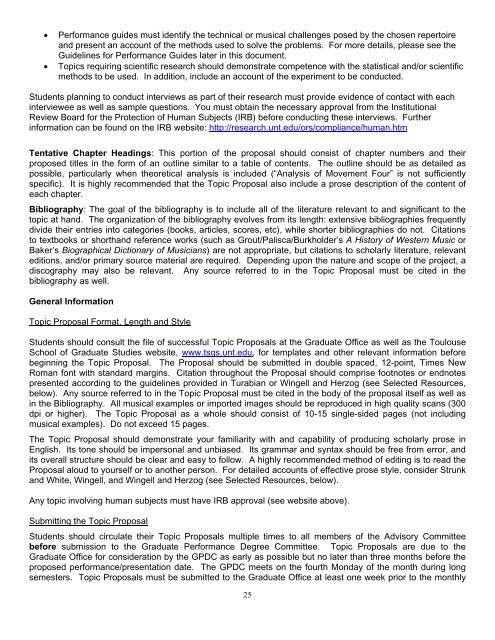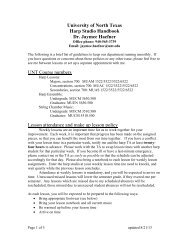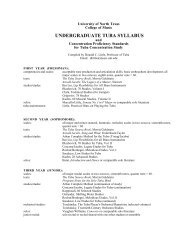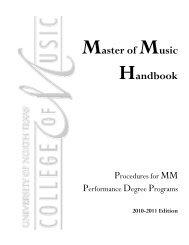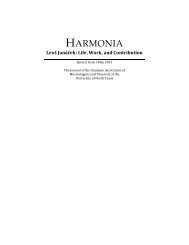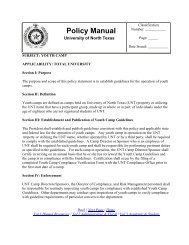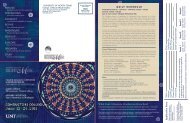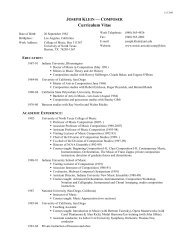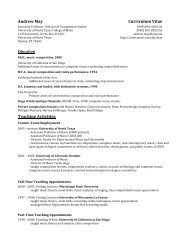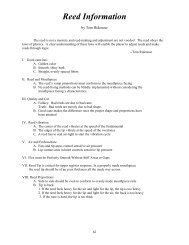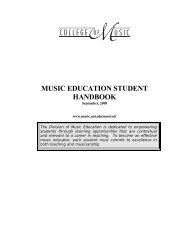Doctor of Musical Arts In Performance Handbook - UNT College of ...
Doctor of Musical Arts In Performance Handbook - UNT College of ...
Doctor of Musical Arts In Performance Handbook - UNT College of ...
Create successful ePaper yourself
Turn your PDF publications into a flip-book with our unique Google optimized e-Paper software.
• <strong>Performance</strong> guides must identify the technical or musical challenges posed by the chosen repertoire<br />
and present an account <strong>of</strong> the methods used to solve the problems. For more details, please see the<br />
Guidelines for <strong>Performance</strong> Guides later in this document.<br />
• Topics requiring scientific research should demonstrate competence with the statistical and/or scientific<br />
methods to be used. <strong>In</strong> addition, include an account <strong>of</strong> the experiment to be conducted.<br />
Students planning to conduct interviews as part <strong>of</strong> their research must provide evidence <strong>of</strong> contact with each<br />
interviewee as well as sample questions. You must obtain the necessary approval from the <strong>In</strong>stitutional<br />
Review Board for the Protection <strong>of</strong> Human Subjects (IRB) before conducting these interviews. Further<br />
information can be found on the IRB website: http://research.unt.edu/ors/compliance/human.htm<br />
Tentative Chapter Headings: This portion <strong>of</strong> the proposal should consist <strong>of</strong> chapter numbers and their<br />
proposed titles in the form <strong>of</strong> an outline similar to a table <strong>of</strong> contents. The outline should be as detailed as<br />
possible, particularly when theoretical analysis is included (“Analysis <strong>of</strong> Movement Four” is not sufficiently<br />
specific). It is highly recommended that the Topic Proposal also include a prose description <strong>of</strong> the content <strong>of</strong><br />
each chapter.<br />
Bibliography: The goal <strong>of</strong> the bibliography is to include all <strong>of</strong> the literature relevant to and significant to the<br />
topic at hand. The organization <strong>of</strong> the bibliography evolves from its length: extensive bibliographies frequently<br />
divide their entries into categories (books, articles, scores, etc), while shorter bibliographies do not. Citations<br />
to textbooks or shorthand reference works (such as Grout/Palisca/Burkholder’s A History <strong>of</strong> Western Music or<br />
Baker’s Biographical Dictionary <strong>of</strong> Musicians) are not appropriate, but citations to scholarly literature, relevant<br />
editions, and/or primary source material are required. Depending upon the nature and scope <strong>of</strong> the project, a<br />
discography may also be relevant. Any source referred to in the Topic Proposal must be cited in the<br />
bibliography as well.<br />
General <strong>In</strong>formation<br />
Topic Proposal Format, Length and Style<br />
Students should consult the file <strong>of</strong> successful Topic Proposals at the Graduate Office as well as the Toulouse<br />
School <strong>of</strong> Graduate Studies website, www.tsgs.unt.edu, for templates and other relevant information before<br />
beginning the Topic Proposal. The Proposal should be submitted in double spaced, 12-point, Times New<br />
Roman font with standard margins. Citation throughout the Proposal should comprise footnotes or endnotes<br />
presented according to the guidelines provided in Turabian or Wingell and Herzog (see Selected Resources,<br />
below). Any source referred to in the Topic Proposal must be cited in the body <strong>of</strong> the proposal itself as well as<br />
in the Bibliography. All musical examples or imported images should be reproduced in high quality scans (300<br />
dpi or higher). The Topic Proposal as a whole should consist <strong>of</strong> 10-15 single-sided pages (not including<br />
musical examples). Do not exceed 15 pages.<br />
The Topic Proposal should demonstrate your familiarity with and capability <strong>of</strong> producing scholarly prose in<br />
English. Its tone should be impersonal and unbiased. Its grammar and syntax should be free from error, and<br />
its overall structure should be clear and easy to follow. A highly recommended method <strong>of</strong> editing is to read the<br />
Proposal aloud to yourself or to another person. For detailed accounts <strong>of</strong> effective prose style, consider Strunk<br />
and White, Wingell, and Wingell and Herzog (see Selected Resources, below).<br />
Any topic involving human subjects must have IRB approval (see website above).<br />
Submitting the Topic Proposal<br />
Students should circulate their Topic Proposals multiple times to all members <strong>of</strong> the Advisory Committee<br />
before submission to the Graduate <strong>Performance</strong> Degree Committee. Topic Proposals are due to the<br />
Graduate Office for consideration by the GPDC as early as possible but no later than three months before the<br />
proposed performance/presentation date. The GPDC meets on the fourth Monday <strong>of</strong> the month during long<br />
semesters. Topic Proposals must be submitted to the Graduate Office at least one week prior to the monthly<br />
25


